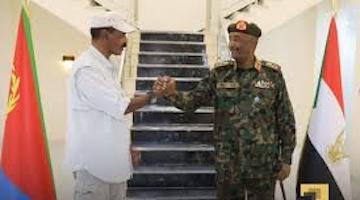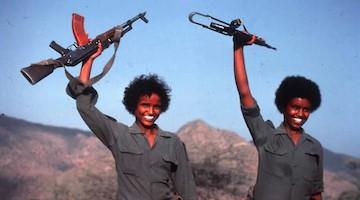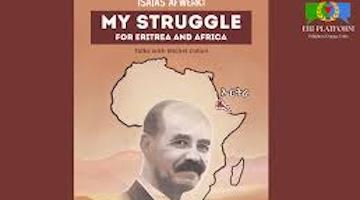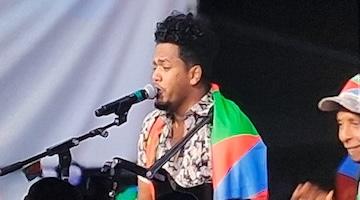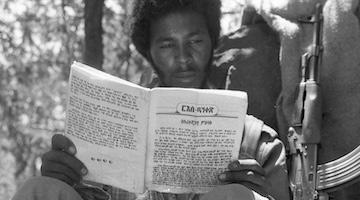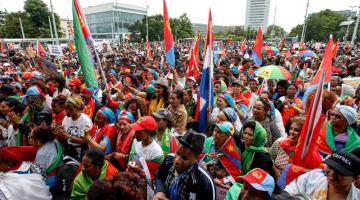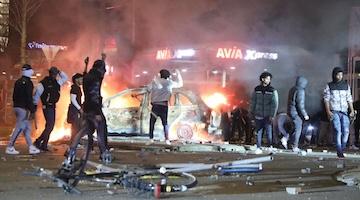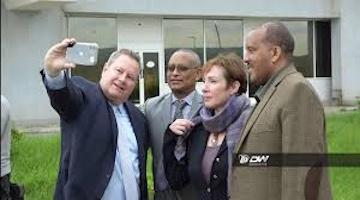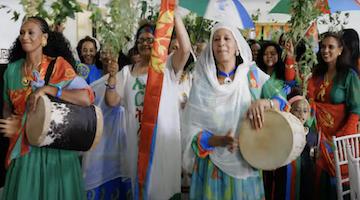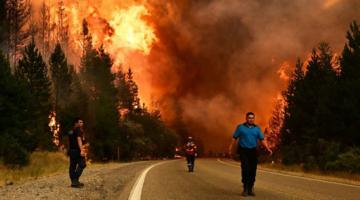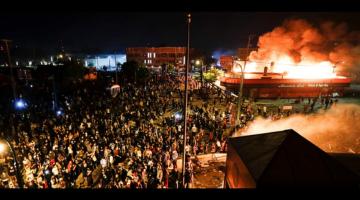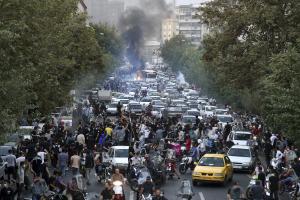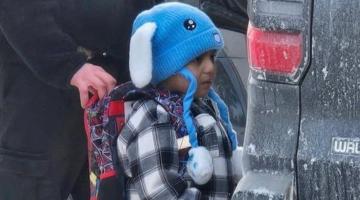The Eritrean people struggle against sanctions and warfare instigated by the US. They recognize their efforts on International Workers Day, May Day.
May Day is a federal holiday in Eritrea, meaning that all workers have the day off and May Day celebrations and marches are held in the capital, Asmara, and in Masawa, Keren, Barentu, Mendefera, and Asseb.
The primary goal of the National Confederation of Eritrean Workers (NCEW) is industrial peace in accordance with the tripartite agreement between government, workers, and employers defined in the Labour Proclamation of Eritrea. I spoke to Abraham Bereket, International Relations Officer for the NCEW, via Zoom. He was in Turkey on a diplomatic mission and celebrating with the Turkish Public Workers Union in Ankara, but he had been involved in organizing the workers’ celebrations in Eritrea, which went on for several days.
ANN GARRISON: Greetings, Abraham. Can you tell us about International Workers’ Day in Eritrea?
ABRAHAM BEREKET: May Day celebrations went on for several days. There was a series of events we organized to make it a vibrant May Day.
One thing I organized, as part of a committee, was a series of seminars and panel discussions on the challenges and opportunities in the future of work.
I’m sure you know about the immense challenges of nation-building from the ashes of the thirty years war for independence, the recent economic destruction and social disruption caused by the border war with Ethiopia, and the pervasive poverty and economic underdevelopment. We face a huge challenge to lift the living and working conditions of Eritrean workers to acceptable, decent levels.
AG: What else took place, in addition to the marches and the panels to celebrate May Day?
AB: We also had events to encourage civic participation. We did three days of blood donations, and we did some tree planting. That’s part of a greening campaign that goes on throughout the year.
AG: Tell us about the National Confederation of Eritrean Workers (NCEW).
AB: It was created in 1979, during the independence struggle. At that time it was formed to recruit workers to serve in the independence struggle. Outside the armed forces it also served to support the struggle financially and logistically.
Now, of course, our aims are different. After independence we did our fourth congress, in 1994, where we shifted our key strategic priorities to securing the rights and well-being of workers.
Now we are spearheading the social dialogue and negotiation with the government and the National Employers' Federation of Eritrea to secure collective bargaining agreements and guarantee International Labour Organization standards. Working with the government and private employers we have established the Labour Relations Board to safeguard workers’ legal rights in disputes.
AG: Who belongs to the Confederation of Eritrean Workers?
AB: We have workers representing five federations constituted of 164 base unions operating in similar products or service areas. As of December 2019, NCEW had a total of 26,000 members, of which 10,702 (41.1%) were women and 15,298 (58.9 %) were men. The five Federations are:
Food, Beverage, Hotels, Tourism, Agriculture and Tobacco Workers Federation of Eritrea – 22%
Mining, Chemical, Construction and General Works Workers Federation of Eritrea – 39%
Service Industries Workers Federation of Eritrea – 10%
Transport and Communication Workers Federation of Eritrea – 15%
Textile, Leather and Allied Products Workers Federation of Eritrea – 14%
AG: And what is the Labor Proclamation of Eritrea?
AB: The labor movement in Eritrea generally is guided by the government’s Labour Proclamation of Eritrea No.118/2001. It is a legal framework that guarantees workers’ rights, the basic rights within international labor organizations—the freedom of speech, freedom to unionize, and collective bargaining rights. This legal framework acts as a base when we try to organize within an enterprise. These are the rights that all workers have.
AG: And what about public workers?
AB: We don’t yet have a legal framework for organizing public workers in the Labour Proclamation, but it is written and waiting for ratification.
We are also working to ratify a legal framework for organizing cooperatives and workers in the informal economy.
AG: I know that the majority of Eritrean workers are in the informal economy, meaning they are largely self-employed, farming to feed their own families.
AB: Yes, that is true.
AG: When I was there, the Agriculture Minister showed me the Minimum Integrated Household Agricultural Package (MIHAP) developed to help farmers expand to where they could produce a surplus to sell at market, feed four more families, and thus free workers from farm labor to help build an industrial base.
AB: Yes, expanding the industrial work force is essential to the future of work in Eritrea.
AG: I have the pamphlet describing the MIHAP and how it is to increase production right here. It says the government will provide one dairy cow or six goats, 25 chicks, two bee hives, and 20 trees—10 fruit trees, five for supplementary forage, and five for firewood.
It’s an impressive development plan for moving beyond basic family farming.
AB: Yes, that’s right, and thank you.
AG: And what sort of work do you do in the informal economy?
AB: We do awareness raising about health and safety, and technical and vocational training—skills development.
AG: What is the informal economy and what is the challenge of organizing it?
AB: There are domestic workers, street vendors, and similar small- scale participants in the informal economy. What we need first is a legal framework for organizing and guaranteeing the rights of these workers. We’re working on that.
AG: Of course Western oligarchs and officials and their press hate Eritrea because they can’t stand its egalitarian example. They love to tell the story that Eritrean soldiers have been forced to work in the Bisha Gold Mine. What is your answer to that?
AB: As a trade union, we organized a symposium and conference in Asmara, and we invited delegates from labor organizations in Europe, Africa, and Asia. At the end we provided vehicles to travel to the Bisha Mine, and allowed them to engage with any workers they liked. When they returned, we asked them if they found any forced labor conditions, and they said no. We had proven to them that there were no soldiers forced to labor in the mine, and at that time those stories stopped.
AG: That story may have stopped but the Western Eritrea haters never stop. They can’t hate or sanction Eritrea enough.
AB: Yes, that’s true.
AG: I know that the history of the NCEW is intertwined with the history of the independence struggle. Could you tell us about that?
AB: The first Eritrean trade unions were factory-based during the colonial period. They emerged in 1948. On February 4, 1952, the factory-based unions coalesced to form the National Union of Eritrean Workers for Independence (NUEWI).
Then the erosion of Eritrea’s political independence by Ethiopia in the 1950s catapulted the union movement into the leading force of the Eritrean nationalist movement.
Ethiopia canceled our trade union rights in 1957. The NUEWI responded by organizing a strike and many members were jailed.
The dispute between the unions and the Ethiopian government came to the forefront in March 1958. Because of the increasing repression perpetrated by the Ethiopian regime, Eritrean workers had sought employment in Europe, North America and the Middle East and regrouped themselves alongside Eritrean students to participate in the Eritrean liberation movement.
AG: I know that the Eritrean independence movement captured the imagination of the world at that time.
AB: Yes, it did. The first meeting of the Eritrean workers in the diaspora was held in Germany in 1970. They named their organization “Eritreans for Liberation” and began to organize in different countries as the Eritrean Workers Union.
Eritrean workers from many parts of the world assembled in the liberated area of Eritrea in November 1979 and founded the National Union of Eritrean Workers (NUEW) in full allegiance to the principles of the Eritrean People’s Liberation Front (EPLF). The second congress of the NUEW was held in 1983 and the third Congress in 1988, all in the liberated areas.
AG: And what happened after the liberation in 1991?
AB: The NUEW leaders and members from the diaspora came to Eritrea after the liberation of the country in May 1991. NUEW coalesced with workers who came from the liberated areas and members of the trade unions previously existing under the Ethiopian military regime in the country.
In June 1992, the NUEW was reconstituted as a provisional organization of Eritrean workers until it was formally organized as the independent National Confederation of Eritrean Workers at the Congress held in September 1994.
In the process, membership was declared to be voluntary. Democratic elections were held at the base union level. The unions were organized into the five sector federations. Each of the sector federations held their congresses and democratically elected their respective leaderships.
A congress embodying representatives of the NUEW and the federations was convened in September 1994. The National Confederation of Eritrean Workers (NCEW) was established at this congress with new and independent statutes. A decision to limit the membership in the NCEW to workers residing within Eritrea was taken at the congress.
Each of the five Federations then developed its own constitution. They hold their respective congresses and elect their representatives, organize their administrative set-ups, and implement their respective programs.
Unlike its predecessor, NCEW membership is open only to workers residing in Eritrea.
AG: What special steps have you taken to ensure the rights of women?
AB: An established Committee on Women’s Affairs ensures that women workers’ issues are given attention. The NCEW has many women elected to positions at the highest leadership level, including membership in the Central Council and Executive Committees of the Confederation, as well as chairpersons and secretaries of federations.
AG: And have you affiliated with international labor organizations?
AB: The NCEW and the federations have become affiliates of regional and international trade union organizations, such as the International Trade Unions Confederation (ITUC), ITUC-Africa, the Global Union Federations (GUF), the Organization of African Trade Union Unity (OATUU), and the International Labour Organization (ILO).
AG: That’s a very impressive history.
AB: Thank you.
AG: Thank you for speaking to Black Agenda Report.
AB: You’re most welcome.
Ann Garrison is a Black Agenda Report Contributing Editor based in the San Francisco Bay Area. In 2014, she received the Victoire Ingabire Umuhoza Democracy and Peace Prize for her reporting on conflict in the African Great Lakes region. She can be reached at ann(at)anngarrison.com.

